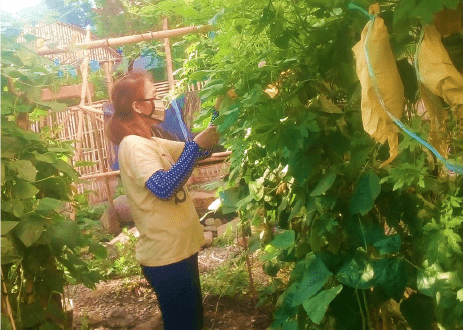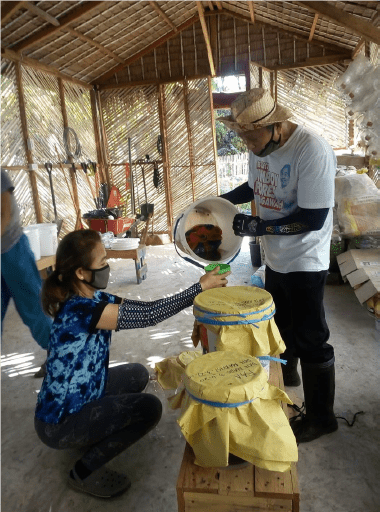
Good Food Farm representative looking after crops at the Bayer Kubo in Barangay Ususan, Taguig City
Farm technologies found between high-rise buildings in Taguig have led to a more reliable food source and year-round livelihood to urban residents facing job and food challenges due to the Luzon-wide lockdown.
The 30-member volunteer farmer residents of the Good Food Farm in Barangay Ususan, Taguig are more grateful than ever for partnering with a multinational company and being trained on how to grow vegetables and herbs under its urban gardening project.
Bayer Philippines under its Bayer Kubo project supplies the seeds to be planted, regular monitoring, and technical assistance provided by Rise Against Hunger and Urban Agriculture Philippines. The 300-square meter Bayer Kubo farm is literally just a few steps away from their residences at Pamayanang Diego Silang in medium-rise BCDA Housing.
The residents planted and harvested different varieties of vegetables, like tomatoes, okra, eggplant, sitaw, mustard, pechay, bitter gourd, lettuce, and bell pepper. Aside from the usual vegetables, they also harvested herbs and spices like basil, tarragon, oregano, roselle, taheebo, gotu kola, serpentine, and lemongrass.
Some of the technologies the urban farmers used were made using available resources, such as fermented fruit juice (FFJ) and fermented plant juice (FPJ). These are effective as organic growth enhancers and pest deterrents for their crops.
Blessing during the Crisis
Since its launch in January this year, the community has not sold much of its produce as the newly trained farmers were still new to farming. However, when the Luzon-wide lockdown was imposed in mid-March, the project became a blessing for the residents because it was a sustainable source of food when people became worried about the lockdown.
“Our farmer volunteers are very happy because they are harvesting fresh and healthy vegetables everyday,” said Jerimy Soronel of Rise Against Hunger (RAH),

Training being conducted among farmer residents on how to produce organic fertilizers
Hunger for More Knowledge
Malou Furio, Good Food Farm president and one of the residents, said they are set to replant this next season and are expecting vegetable seeds from the Department of Agriculture (DA) as they have allotted funding for urban agriculture projects. “We don’t want to neglect our farm,” said Furio. “It is good that we are able to continue being productive during this lockdown.”
The community is eager to learn more about increasing their harvest so that they can turn the farm into a viable business venture. However, some of these learning activities were delayed due to the lockdown. “Because of the quarantine, some of the scheduled training were postponed, but we still managed to maintain the existing crops and apply what we already know,” Furio added.
“We rely on our farmers to continue tilling the land so that we can have food on our tables in the next few months,” said Bryan Rivera, head of communications, public affairs, and sustainability for Bayer Philippines. “Having an opportunity to create food where it’s not usually grown is a worthwhile experience that Barangay Ususan residents are truly enjoying.”
Attention Shift to Agriculture
The DA called on all sectors to support agriculture during this crisis to prevent food shortage. The agency met with the Philippine Seed Industry Association (PSIA), the national association of seed producers and distributors, to lead its urban agriculture promotion in Metro Manila by working with DA and local government units.
“In our current quarantine measures, aside from our frontline health workers and need for sustained food distribution, agriculture has been given the attention it deserves,” added Rivera. “Incidentally, our Bayer Kubo project is also getting more support from the people managing the vegetable crops since it is a fundamental source of food.”
More than just a Farm
Interestingly, the Bayer Kubo urban farm is a holistic venue not only for growing food. It plans to serve the community on concerns related to health.
“We consider Bayer Kubo as providing a wider scope of benefits to enhance and strengthen urban communities. This includes increasing awareness and appreciation of urban agriculture, promote health & wellness, and introduce other practical topics that would benefit the residents,” said Rivera. (Rommel F. Lopez)